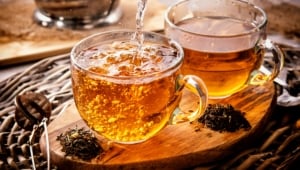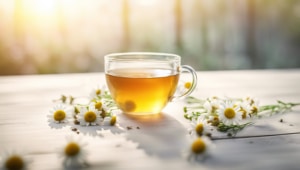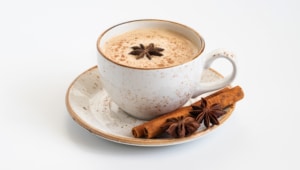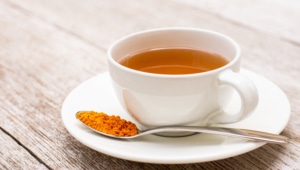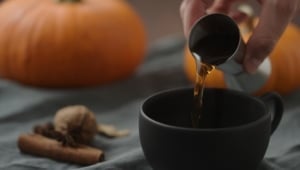7 Health Benefits of Hibiscus Tea & 6 Tips
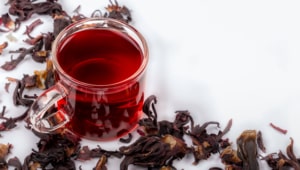
Hibiscus is widely known for its beautiful, large flowers. Yet since the 17th century, farmers across Hawaii, Florida, the Caribbean, Mexico, Guatemala, and as far as Australia began to grow it for another use: tea. Find here all of the health benefits of hibiscus tea.
Hibiscus tea has an unusual fruity, tart, slightly sweet taste that’s a little like fresh cranberry juice. However, this isn’t just a pretty red tea with delightful flavors; it’s full of health benefits that are great for all kinds of ailments.
What Hibiscus Tea Is: Interesting Facts

What Hibiscus Tea Is: Interesting Facts
All varieties of hibiscus are edible, though the Hibiscus Sabdariffa variety is most commonly used for tea. Interestingly, the Hibiscus Syriacus (Rose of Sharon) is toxic to pets.
If you have a Hibiscus Sabdariffa plant at home, you can actually make your tea using its fresh flowers. Alternatively, you could dry them in a dehydrator and make a beautiful homemade blend to share with friends and family.
In some cultures, all parts of the hibiscus plant are used, with the leaves apparently being quite spicy and being used in chutney recipes.
You can also eat the seeds, which are sometimes pressed to make a cooking oil known as ‘mesta’. After this extraction process, the seeds are sometimes roasted and made into a kind of coffee.
Origin and Where Hibiscus Tea Comes From

Origin and Where Hibiscus Tea Comes From
Hibiscus tea was first cultivated throughout the 1600s and 1700s. This is when farmers began to see its value across much of Central America, Mexico, the Caribbean, and Australia.
Interestingly, some sources claim that hibiscus tea was a preferred beverage of the pharaohs of old. While it was seen as a delicious drink even then, it’s also long been known for its helpful benefits for keeping your body healthy.
What Hibiscus Tea Is Made Of

What Hibiscus Tea Is Made Of
Hibiscus tea is made from dried flowers of the Hibiscus Sabdariffa plant. Because hibiscus is usually bright red in color, the tea also takes on a beautiful, berry-red coloring and almost berry-like taste.
What Hibiscus Tea Tastes Like
Hibiscus tea tastes a little like warmed cranberry juice, offering a mix of sweetness and tartness. It’s fruity and quite unusual – not at all how you’d expect a flower to taste. Because it’s naturally sweet, it’s very nice on its own without added sweeteners.
Nutritional Facts and Calories of Hibiscus Tea

Nutritional Facts and Calories of Hibiscus Tea
Raw hibiscus flowers contain a lot of nutrients, while the dried tea loses some of these. If you have access to a Hibiscus Sabdariffa plant, you may wish to brew your tea from the fresh flowers.
With that said, both fresh and dried contain: carbohydrates, B vitamins, vitamin C, calcium, magnesium, and potassium.
Hibiscus tea is also full of healthy antioxidants including polyphenols, which can help prevent free radicals from building up in your body.
Interestingly, hibiscus seeds offer additional benefits. They’re a rich source of protein and include amino acids such as glutamic acid, lysine, leucine, arginine, and phenylalanine. If you have access to the seeds as well as the tea, you may well wish to incorporate both into your diet.
Health Benefits of Drinking Hibiscus Tea

Health Benefits of Drinking Hibiscus Tea
Hibiscus tea may be one of the more unusual brews you can make at home, but it’s filled with healthy benefits. Add it to your daily diet and enjoy up to two to four cups per day to reap the benefits below.
May Lower Bad Cholesterol Levels

May Lower Bad Cholesterol Levels
Several studies have discovered that consuming hibiscus tea lowers levels of ‘bad’ LDL cholesterol in your body. You may also get the same effects by taking hibiscus extract capsules, just be mindful of buying them from a reputable source.
Filled with Helpful Antioxidants

Filled with Helpful Antioxidants
Hibiscus tea is full of antioxidants, including anthocyanin and beta-carotene. These help fight free radicals in your body, and ward off against a number of ailments.
Consuming plenty of antioxidant-rich foods and drinks can reduce your risk of developing heart disease and even some cancers.
Might Help with Losing Weight

Might Help with Losing Weight
Some studies have shown that hibiscus tea can help prevent obesity and promote healthy weight loss. One study focused on hibiscus extract, which also appeared to be helpful at reducing body weight.
If you’re on a healthy weight loss diet, adding hibiscus tea to your routine may well help you achieve your goals.
Could Help Manage Blood Sugar Levels
If you’re diabetic, you may wish to consult your doctor about adding hibiscus tea to your diet. Having hibiscus tea regularly can reduce inflammation in your body and help lower blood sugar levels.
Hibiscus tea may also be helpful at reducing resistance to insulin in your body.
Full of Vitamins to Boost Your Immune System

Full of Vitamins to Boost Your Immune System
Hibiscus tea is a good source of B vitamins and vitamin C. Vitamin C in particular helps strengthen your immune system. You may still get sick, but you may not be ill for as long or as badly as you would be without the vitamin C.
Could Help Fight Some Types of Cancer

Could Help Fight Some Types of Cancer
A study has shown that taking hibiscus extract can limit cell growth as well as reducing how invasive mouth cancer might get.
Similarly, hibiscus tea has been shown to possibly help prevent several different cancers from spreading.
If you’re in the unfortunate situation of having to fight cancer, incorporating hibiscus tea into your diet may be helpful alongside more traditional medicines.
May Boost Your Liver Health

May Boost Your Liver Health
Hibiscus tea is a helpful addition to your diet when it comes to keeping your liver healthy. Studies have shown that hibiscus extract gives protective properties to your liver, warding off toxins.
This is likely due to the antioxidants in the plant, meaning hibiscus tea should give you some protection as well.
Potential Risks

Potential Risks
As with anything, hibiscus tea may also carry some risks when consumed in large amounts. Enjoyed in moderation, most people should have absolutely no harmful side effects. However, you may wish to proceed with caution if you have certain health conditions.
Could Cause a Drop in Blood Pressure

Could Cause a Drop in Blood Pressure
Depending on your situation, this could be both a benefit and a risk factor. Studies have shown that hibiscus promotes the expansion of blood vessels.
This causes a drop in blood pressure — great if you suffer from high blood pressure, but something to be aware of if your blood pressure is naturally on the lower side.
Phytoestrogens May Adversely Affect Some Cancers

Phytoestrogens May Adversely Affect Some Cancers
There’s no consensus on this, but phytoestrogens might disrupt your hormonal balance. This could be harmful in the cases of some cancers.
On the other hand, some experts seem to suggest that consuming plenty of phytoestrogens in childhood is linked to a decreased likelihood of developing breast cancer.
May Cause Allergic Reactions in Some
If you’re allergic to other members of the Malvaceae plant family, you may wish to steer clear of hibiscus.
This includes mallow, okra, and hollyhocks, amongst others. Allergies can be severe in some people, so proceed with caution if you do have symptoms.
Is Hibiscus Tea in Pregnancy Good For You?

Is Hibiscus Tea in Pregnancy Good For You?
Unfortunately, hibiscus tea isn’t a good choice for pregnancy. As it contains phytoestrogens, which simulate the effects of estrogen in your body, hibiscus tea may cause preterm labor or miscarriage.
As for breastfeeding, phytoestrogens may increase milk supply. However that’s where hibiscus tea’s benefits for breastfeeding mums end, as this tea can also decrease your blood pressure and blood sugar levels.
Therefore, neither pregnant nor breastfeeding women should drink hibiscus tea. Opt for an alternative such as rooibos tea instead, or enjoy some natural fruit teas for similar flavors with plenty of vitamin C and helpful minerals.
Simple Guide for Making the Perfect Hibiscus Tea

Simple Guide for Making the Perfect Hibiscus Tea
Hibiscus tea can be enjoyed hot or cold, and both are great for a variety of ailments. We like our hibiscus tea iced with a touch of honey, some raspberries, and a sprig of zingy mint.
Feel free to skip the honey and use another kind of sweetener or sugar, or add lemon if you prefer a more tart beverage.
Ingredients:
- ¼ cup of your favorite dried hibiscus tea
- 4 cups of cooled, filtered water
- honey
- some fresh mint sprigs
- ¼ cup of fresh or frozen raspberries
- ice, to serve
And here’s how you do it:
- Add the hibiscus tea to your filtered water, ideally in a pitcher. Stir until combined, then leave overnight to steep. This is similar to the way you’d make cold-brewed coffee.
- Strain the tea and add the honey, to taste.
- Pour your hibiscus tea into glasses with ice, raspberries, and mint. Serve and enjoy.
Tips for Drinking and Serving Hibiscus Tea

Tips for Drinking and Serving Hibiscus Tea
Hibiscus tea is a really unique beverage all on its own. It has different flavors from any other type of tea, tasting almost like fresh fruit despite being made of dried flowers.
With that in mind, you may wish to play with the tips below to make it even tastier.
Add Honey for Some Sweetness

Add Honey for Some Sweetness
Honey offers a huge variety of health benefits, including anti-inflammatory and antioxidant properties.
It’s great for fighting off infections, helping with respiratory bugs, and giving some protection to your nervous system and heart.
Besides all of that, honey is delicious, and will make your mildly sweet hibiscus tea super sweet and tasty.
Enjoy Your Hibiscus Tea Iced

Enjoy Your Hibiscus Tea Iced
Iced hibiscus tea tastes a little like berry iced tea. It’s particularly good with added lemon, honey, and sprigs of fresh mint. Adding fresh raspberries makes it even fruitier and more delicious.
You could even freeze hibiscus tea in ice cube trays for a refreshing, colorful pop of flavor to other iced beverages. It’s particularly nice with iced lemonade.
Mix it with Some Lemon and Mint

Mix it with Some Lemon and Mint
Continuing on from the above, adding lemon and mint to your iced hibiscus tea is a great choice. It makes it zingier even more refreshing, enhancing the lovely natural tartness of the tea.
You could also add lemon and mint to hot hibiscus tea, to make a warming beverage. The lemon is high in vitamin C and will help fight off bugs. Add some honey too, for a great cold and flu tea.
Hacks and Tips

Hacks and Tips
If just adding regular tea ingredients to your hibiscus tea is… well, a bit too bland for you, we’ve got you covered. Hibiscus tea works wonderfully for all kinds of concoctions.
Our bonus one may surprise you, but is well worth making, alongside a nice cup of tea.
Make a Hibiscus Tea Cocktail

Make a Hibiscus Tea Cocktail
Hibiscus tea actually makes a great addition to cocktails. Of course as far as health drinks go, you may wish to skip the alcohol. But if you’re looking for a less sugary option for your next cocktail, hibiscus tea offers a lovely natural sweetness.
Simply steep some hibiscus tea in either hot or cold water. Just remember to steep it overnight if using the ‘cold brew’ method. If you’re making fresh hot tea, cool it before making a cocktail.
Mix approximately 3 fl oz of hibiscus tea with 2 fl oz of lemon juice, and 2 fl oz of vodka. Add some honey or simple syrup and ice, and enjoy.
Make a Healthy Green Tea and Hibiscus Iced Tea

Make a Healthy Green Tea and Hibiscus Iced Tea
You can make iced tea from any kind of tea. Mixing green tea with hibiscus will yield a healthy, flavorful iced tea.
Best of all, green tea is known for being full of antioxidants, offering brain protective benefits, and more.
Add some simple syrup or honey to your mix for sweetness, or a few slices of lemon to make it more tart.
Since hibiscus tea is fruit and green tea offers a herbaceous earthiness, your iced tea will be reminiscent of other fruity ice teas.
Bonus: Add Hibiscus to Delicious Bakes and Treats

Bonus: Add Hibiscus to Delicious Bakes and Treats
Did you know that you can use all parts of the Hibiscus Sabdariffa plant for your baking? You could make a delicious hibiscus loaf cake or glazed hibiscus shortbread cookies.
The latter makes clever use of hibiscus tea in the glaze, resulting in a hot pink sugary decoration. Don’t want anything sweet?
Try your hand at making hibiscus leaf chutney, which uses the leaves, oil, shallots, garlic, ginger, chili, mustard seeds, fenugreek, and a little salt.
This makes for a delicious, quite sour chutney that adds a kick of spice to rice, bread, or veggies.
- Chai Tea. Health Benefits and Hacks.
- Raspberry Leaf Tea. Tips, Hacks and Health Benefits.
- Starbucks Refresher. Tips and Best Drinks.
- Jelly Belly Flavors. Best and Grossest.
- Boba Flavors. Best Flavors and Types.
- Pop Tart Flavors. Tasty Alternatives and Best Flavors.
- Cinnamon Tea. Health Benefits and Tips.
